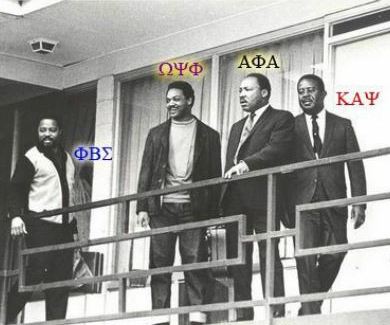Chaos, Community, and the Divine Nine

This year’s Martin Luther King Day celebration on January 15th held a number of surprises for school community thanks to the efforts of Diversity and Institutional Equity Director Orinthia Swindell and Associate Director Russell Marsh. The school has become accustomed to the annual schoolwide event started by former Diversity Director Dr. Eddie Moore, known as Simple&Powerful, in which members of the school community enter the buildings in silence to honor and hear Dr. King’s message from a video kiosk. Throughout this special day, young students gather in the Pearl Street lobby to form a circle and listen usually to Dr. King’s iconic “I Have a Dream” speech.
This year, in a greater effort to reach the hearts of the adults in the community who are already familiar with that speech, Orinthia and Russell instead hoped to engage new listeners with King’s “Where Do We Go From Here: Chaos or Community” speech he gave at the Southern Christian Leadership Conference in Atlanta in 1967. That same year he published a book with the same title.
An excerpt:
“Who owns the oil?…Who owns the iron ore? …Why do we have to pay water bills when the world is two-thirds water? Don’t think you have me in a bind today because I’m not talking about communism. My inspiration didn’t come from Karl Marx…If you will, let me be a preacher just a little bit…You must be born again. Our whole structure must be changed. A nation that will keep people in slavery for 244 years will “thingify” them and make them things. And therefore, they will exploit them, and poor people generally economically. And a nation that will exploit economically will have to have foreign investments and everything else, and it will have to use its military might to protect them. All of these problems are tied together. What I’m saying today is that we must go from this convention and say, ‘America, you must be born again!’ And so, I conclude by saying today that we have a task, and let us go out with a divine dissatisfaction.” (hear the full excerpt here).
This year the preschool teachers for the first time passed around a microphone and asked students what they knew about Dr. King and what he did. “One student said, ‘Dr. King used his words and wanted everyone to be nice to each other. When I grow up I want to be like him,'” Orinthia recounted.
The biggest change to this year’s Simple&Powerful celebration was a special all-school collection in the Pearl Street meeting house in which Dr. King was presented from an entirely unexpected angle: his college fraternity days. First off, he was no ordinary frat boy. “He was a member of Alpha Phi Alpha,” said Russell, “the first historically black college fraternity, and it’s a service organization. ” A fraternity that’s first and foremost a service organization? Yep, and his wasn’t the only one. “Alphas are part of the Divine Nine, that are all service organizations. The Divine Nine sororities and fraternities were actively involved in all of the major movements of the twentieth century,” said Russell, “women’s suffrage, integration.”
He rattled off a veritable Who’s Who of members. W.E.B. Dubois, Langston Hughes, Cornell West, Toni Morrison, Tavis Smiley, Ruby Dee, Shaquille O’Neal, Shirley Chisolm and Wilt Chamberlain to name but a few. “You don’t have to be an African-American but historically they are. You don’t have to be white to be in a historically white fraternity or sorority. Likewise you don’t have to be black to be in a historically black fraternity or sorority. Bill Clinton was a Sigma. Eleanor Roosevelt was in Alpha Kappa Alpha.”
Closer to home, Russell and Orinthia partnered with BFS parents, the Student Council, and Friends Academy on Long Island to get representatives from five of the Divine Nine to participate in a panel discussion. The group included two BFS parents. Additionally BFS alum (and parent) Derek Lynch ’88 became a Kappa at Oberlin. Middle School Head Glen Pinder, Director of All-School Enrollment Karine Blemur-Chapman and Russell himself are also members of Divine Nine organizations.
To help students understand the necessity of these sororities and fraternities, Orinthia and Russell linked them to affinity groups and pointed out that three of them started at historically white colleges. “The Alphas were founded at Cornell University in 1906,” explained Russell. “Imagine being a black man at Cornell in 1906.”
The panel also served to dispel some of the worst stories about Greek life. These student groups are unusual. There are no hazing rituals or dangerous drinking games. “Service is in our phrases, our statements of purpose,” said Russell. “Our overall message to the students was that the struggle didn’t end with Dr. King. It continues right now.” He proudly pointed out that the November football strike at the University of Missouri over troubling racial incidents at the college was organized by a Sigma student.
The packed event ran over the scheduled time because students kept asking the panelists questions. Plans are already underway for a similar event next year. “The students want more of it,” said Orinthia.
A week prior, she and Russell also held morning and evening meetings for parents called Let’s Chat. “It was a conversation between the parents and the Diversity Office,” said Orinthia. “We explained the work that we do and heard suggestions for what they would like to see us do. It was an opportunity for people to ask about the work that’s being done here and for us to dispel some rumors.”
“It was well-attended from Preschool parents on up,” said Russell. They plan to hold similar events for parents going forward.
